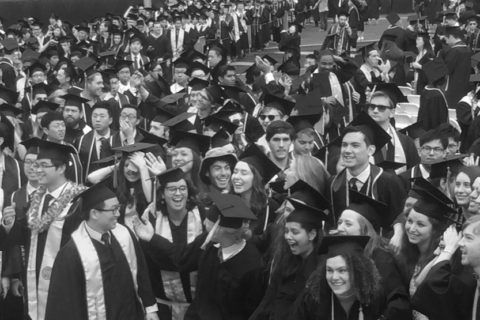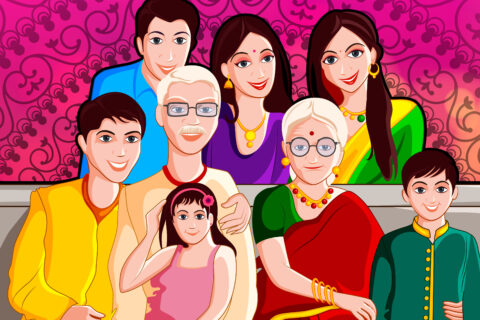
Immigration issues are real for liberals and conservatives alike. Over the years, the influx of immigrants to the coastal regions of America has spurred their economies. It is the cross-fertilization of American integrity and ingenuity, with ethnically and socioeconomically diverse immigrants — willing and eager to work hard — that has increased the US competitiveness in the global markets.
A more profound immigration policy is needed to regulate the number of new entrants we can absorb, whether they are seeking better lives, safety or refuge — while keeping our economy vibrant and preserving law and order. For it to be lasting it must entail fairness and compassion, within and beyond our borders.
Europe’s immigration problems are worse than that of the US, as we heard on our recent visit to Austria and Germany. My husband and I conversed with several intellectuals and other people of privilege. Their perspectives reflected the complexity of the European Union (EU).
Our hosts in Austria were an Indian man who had been in my husband’s class at IIT Engineering College — and his wife, an Austrian baroness. He had served as the head of European IFC, a private sister organization to World Bank, and lived most of his life in Washington, DC and Paris. He hosts dignitaries and discusses on international affairs. They now live in Paris and Austria.
They had thrown a lavish banquet at their home — a medieval castle with its own Church. The other guests were both intellectuals and aristocrats. It was a rare opportunity to get a glimpse into their lives and thinking.
It made me study the post-World War II era and how the US played a major role in bringing peace, rebuilding Europe and shaping its own immigration policy.
As a new democracy and far away from Europe, the United States has a different history of immigration.
- For the first 100 years after the declaration of independence, the United States had completely open borders but the bulk of immigrants were white Europeans. By today’s definition, like Latin American immigrants, they had no papers and many spoke other languages — not necessarily English. Some of them also experienced persecution in America.
- In the late 1800s, thousands of Chinese workers came to the US to build the railroads. Then the resentment against them grew, calling them cheap-labor. This led to the 1882 Chinese Exclusion Act prohibiting Chinese immigration — the first immigration limiting act. Middle Easterners, Hindus and East Indians, and the Japanese were also termed “undesirable.”
- In 1942, the Bracero Program brought 4 million Mexican farmworkers into the country under temporary work permits. Many of these workers remained in the country. This made agriculture a premium industry of California.
- The 1965 Immigration and Naturalization Act, abolished an earlier quota system based on national origin and established a new immigration policy based on reuniting immigrant families and attracting skilled labor to the United States. The leaders of the Civil Rights movement viewed the quota system as backward and discriminatory.
Our visit to Austria reminded me how World War II, which killed an estimated 50-80 million people and with the looming fear of nuclear war, led to the formation of the United Nations. It was established to preserve international cooperation while respecting national sovereignty. At the same time, sentiments of peace and tolerance were growing. MLK Jr.’s and Gandhi’s philosophies of nonviolence were gaining momentum.
The US would join hands with our Western allies to protect each other militarily, economically, with trust and compassion and signed 1951 Refugee Convention documents.
And then Europe led a complex formation of EU. The EU was awarded the Nobel Peace Prize for the advancement of peace, democracy and human rights. It made trade easier, and countries assumed fiscal responsibilities for each other. Refugees could move around more fluidly within EU countries. In light of increased fear of terrorism, it is now being rejected by many nations — leading to Brexit.
We are more in control of our destiny, compared to Europe.
Our 2000 miles long border with Mexico is difficult to secure. There are 30-40K apprehensions every month, including asylum seekers from Honduras, Guatemala, and El Salvador — entering legally by turning themselves in. They are fleeing gang recruitment, protection rackets, abusive police, and inept criminal justice systems.
Immigration handling has to be inclusive of establishing a better socio-economic order for others.
After World War II, US Secretary of State George Marshall presented the European Recovery Program, which became the Marshall Plan. His policy he stated “is directed … against hunger, poverty, desperation and chaos (of the war). Its purpose should be the revival of a working economy in the world so as to permit the emergence of political and social conditions in which free institutions can exist.” It did not escape serious criticism.
Our future leaders need to design a ‘Marshall Plan for Immigration’. It will take financial capital, political will and social conscience. And as George Marshall said, “it has to provide…cure rather than a mere palliative.”
History itself should and does get forgotten, but the lessons learned, give us a perspective, of what is possible, when it looked impossible.








Raj Singh
Vinita ji, a good coverage of current topic of interest. I myself landed on the US soul under 1965 act. I had applied for immigration in 1970 in Delhi after leaving a short stint in the Indian Navy.
My immigration was approved within six months but I came much later in 1980 as a student so as to refresh my knowledge in computer science before starting a job. I was working in Libya that time.
In between I did a small business in Meerut that failed, thanks to theft by Indian railways; pursued applied mathematics at IIT Delhi; a job at a startup in Delhi that was shut down after three years of R&D, thanks to India Gandhi; a job in Abu Dhabi telephone exchange before taking a job in Tripoli under Indian government’s foreign assignment to Libya.
I have been a migratory bird and love liberal policies of immigration.
I believe in what you said in your post:
History itself should and does get forgotten, but the lessons learnt, give us a perspective, of what is possible, when it looked impossible…..past, present and future….
— Raj Singh
rabindra sahdev
Very well written and well organized article Vinita
The US needs to show balance in its immigration policies between being compassionate and up holding laws, however we to cannot be all things to all people.
Vijay Gupta
US Immigration is a fascinating subject. You can study the entire social, economic and political history of the US through the lens of immigration.
The Immigration Act of 1965 which eliminated racial preference for white immigrants was a natural consequence of the Civil Rights Act of 1964 (made possible by the struggle of African-Americans). Thus all immigrants who benefited from the 1965 act (including most Indian Americans) have good reasons to be grateful to African-Americans who helped open the doors of America for them.
Currently, Democrats generally support immigration based on family reunification (because of Hispanic vote bank) and oppose immigration based on skill (because of labor vote bank). Republicans generally support immigration based on skill (to help business owners who fund their election campaigns) and oppose immigration based on family reunification (because of white vote bank).
Both parties implicitly support undocumented workers because they help the US economy and keep the cost of many goods down. (Undocumented workers work much harder, and for lower wages.) That is why there are no serious penalties against employers who hire undocumented workers. The political battle over the border wall is mostly symbolic, and almost comical.
vinitagupta
So true. Hopefully, the differences and debates make better even though arguments tend to be strenuous.
Mihir Meghani
Vinitaji, great article. One thing I wonder about is that while people talk about open economic borders, there is little discussion about the fact that there is no open immigration border. I am not advocating for that but open borderss are in my mind the only way to really have global economic parity. Of course, that comes with social disruption
vinitagupta
I think there was such a realization after WW2. but now the reverse sentiments are gaining momentum in the US and Europe.
Sylvia
Despite all differences and different pasts, both the US and Europe face significant, but yet unresolved immigration problems. What applies to both: Closing the borders is not the solution to the problems and well-balanced solutions on the political level are needed.
Europe struggles for common approaches at this level in particular over the last five years. It makes me desperate, although I generally support the ideas an ideals of the European Union.
Political solutions are one side. However, there is something beyond conservative or liberal views on that topic and something beyond figures and quota. For me, immigration is always closely linked to integration. And integration e.g. in the job markets only works with good (language) skills and education and most important the willingness of each individual involved.
And I would like to mention the positive signs that integration is progressing, despite all endless political debates. Looking at Germany in particular (with a national lack and need of skilled workers and specialists), by mid-2016, only seven percent of refugees had a job. In October 2019, 40 percent will work according to recent surveys. Every second refugee works as a helper, the other half as a specialist. Immigration and integration are of course big challenges, but I believe “Wir schaffen das”.
vinitagupta
Thanks for adding your perspective from Munich.